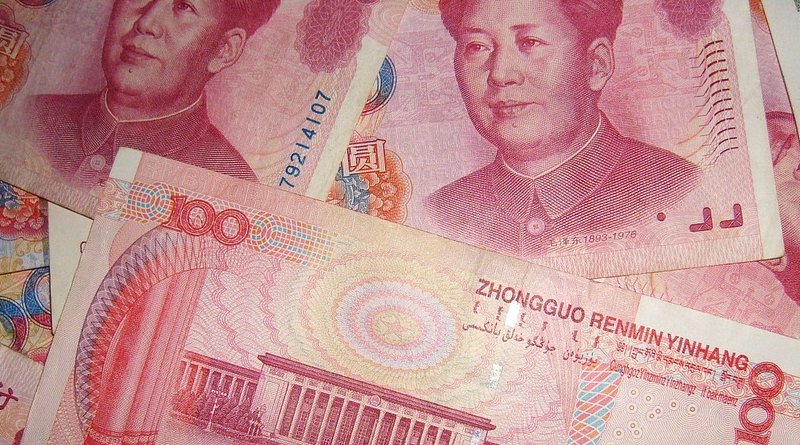Why A ‘Cryto-Yuan’ Won’t Threaten The Dollar – OpEd
By MISES
By Daniel Lacalle*
A state-owned cryptocurrency is, in itself, a contradiction in terms. The main reason why citizens want to use cryptocurrencies or gold is precisely to avoid the government or central bank monopoly of money.
For a currency to be a world reserve of value, widespread means of exchange and unit of measure, there are many things that need to happen, but the first pillar of a world reserve currency is stability and transparency.
China cannot disrupt the global monetary system and dethrone the US dollar when it has one of the world’s tightest capital control systems, a lack of separation of powers and weak transparency in its own financial system.
The U.S. dollar is the most traded currency in the world, and growing according to the Bank of International Settlement. The Yuan is 4% of the currency trade. This is because the financial balance of the US is the strongest, legal and investor security is one of the strongest in the world, and the currency and capital markets are open and transparent.
Unfortunately for China, the idea of a gold-backed cryptocurrency starts from the wrong premise. China’s own currency, the Yuan, is not backed by either global use nor gold. At all. China’s total gold reserves are less than 0.25% of its money supply. Many say that we do not know the real extent of China’s gold reserves. However, this goes back to my previous point. What confidence is the world going to have on a currency where the real level of gold reserves is simply a guess? Furthermore, why would any serious government under-report its gold reserves if it wants to be a safe haven, reserve status currency? It makes no sense.
The Yuan is as unsupported as any fiat currency, like the U.S. dollar, but much less traded and used as a store of value. As such, a cryptocurrency would not be backed by gold either. Even if the government said it was, and deployed all its reserves to the cryptocurrency, what confidence does the investor have that such backing will be guaranteed when the evidence is that even Chinese citizens have enormous limits to access their own savings in gold?
China’s gold reserves are an insignificant fraction of its money supply. Its biggest weakness comes from capital controls, lack of open and independent institutions safeguarding investors and constant intervention in its financial market.
China’s Yuan may become a world reserve currency one day. It will never happen while capital controls remain and legal-investor security is limited.
Originally published at DLacalle.com
*About the author: Daniel Lacalle has a PhD in Economics and is author of Escape from the Central Bank Trap, Life In The Financial Markets and The Energy World Is Flat.
Source: This article was published by the MISES Institute


Yeah we’re invincible
I have three issues with this short article. First, the article started with the title that Yuan and crypto will not threaten the dollar and later stated that these will not dethrone the dollar. So, it is either a threat or an eliminator of the dollar. For the title, yes, the Yuan, crypto, other currencies, and gold can eliminate the dollar as a reserve currency. De-dollarization is a very possible outcome, because the US economy has been stagnating and in debt for long time with a low economic growth and productivity. These basics will not allow the fiat dollar to continue as a reserve currency.
Second, the US dollar is backed by the Pentagon and militarism. Many countries trying to go out of the dollar have been threatened by the USA such as Iraq in the past and now Iran, Lebanon, Syria, and Venezuela. But the US involvements in several possible wars with countries and the US threats to strong countries such as Russia and China will be reflected on the back-up of the dollar. This means that the USA cannot go to wars with many countries at the same time, given the fact that it cannot win its war in Afghanistan. It is also true that these threatened countries can cooperate and use domestic currencies in trade in order to avoid the dollar. Some of them even can sell oil by not using the dollar, a process that will threaten the Petro-dollar.
Third, yet China does have capital control and other issues but the USA has problems too that push countries away from the dollar. For example, the USA has been using sanctions against countries that do not submit to the USA policies and visions. These sanctions have nothing to do with the US national security but they are designed for a hegemonic cause. Many countries are not interested in being submitted to the USA, given they are using the dollar as a reserve currency. Countries will have to drop the dollar for their sovereignty and independence.
The Yuan doesn’t need to be backed by gold because the Chinese people trust it. Both their crypto and petrol yuan are backed by gold because that will be available to the world outside of China, but with 22,000 tonnes the Chinese have what it takes.
“The U.S. dollar is the most traded currency in the world, and growing according to the Bank of International Settlement. The Yuan is 4% of the currency trade. ” Currency traders are trading $6 trillion dollars a day – buying and selling money. If the U.S. dollar is the most traded currency, that means it’s volatile; it’s going up and down a lot. If the Yuan is only 4% of the currency trade, that means it’s stable.